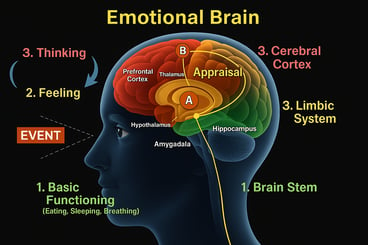What Is Integral Eye Movement Therapy (IEMT)?
Integral Eye Movement Therapy (IEMT) is a brief, change-focused therapy that uses guided eye movements to help individuals shift emotional responses and resolve past experiences. It is particularly effective for addressing anxiety, trauma, guilt, shame, and limiting self-beliefs. Unlike traditional talk therapies, IEMT does not require clients to discuss traumatic events in detail. Instead, it focuses on how memories and emotions are stored in the brain and works by altering the neurological encoding of these experiences. Practitioners guide the client through specific eye movement patterns while the client brings emotional or identity imprints to mind. This process helps reduce emotional intensity, create dissociation from distressing states, and allow more adaptive ways of thinking and feeling. Developed by Andrew T. Austin, IEMT draws upon elements of neurolinguistic programming (NLP) and aims to create rapid, lasting emotional change. It’s commonly used by therapists, coaches, and mental health practitioners across various settings.
How It Works
A – Appraisal Center (Thalamus/Amygdala region)
This is where the brain first registers and appraises emotional significance from sensory input (the “event”). It helps determine if something is a threat or emotionally important.
The Emotional Brain is often explained using the Triune Brain Theory, which describes three core systems within the human brain: the brainstem, limbic system, and neocortex. Each system plays a unique role in how we experience the world. The brainstem governs survival instincts, the limbic system manages emotional responses, and the neocortex is responsible for conscious thought and reasoning. Understanding the Emotional Brain through this model helps us see how deeply emotional patterns are formed and why they can be difficult to change. It also shows how targeted therapeutic approaches can access and update emotional imprints stored in the deeper regions of the brain, leading to meaningful and lasting change.




B – Conscious Processing (Prefrontal Cortex)
This is where higher-order thinking occurs, like reasoning, reflection, and regulation of emotions. It’s where emotional input is interpreted consciously and can be reframed or suppressed.
Emotional Imprint Change: Shifts emotional intensity held in memory.
Identity Imprint Change: Restructures beliefs about yourself.
Chronicity Loop Work: Breaks psychological patterns that repeat.








How IEMT Can Help You
Integral Eye Movement Therapy for Emotional Wellbeing
Integral Eye Movement Therapy (IEMT) is a powerful and effective therapeutic approach that helps individuals shift the way they experience negative emotions, memories, and identity beliefs. Unlike traditional talk therapies, IEMT focuses on how problems are encoded neurologically, allowing for fast and lasting change.
Common Areas IEMT Can Help With
Emotional Triggers
Reduce the intensity of recurring emotional reactions like anger, guilt, and shame.
Phobias
Break patterns of worry, dread, and irrational fear through emotional imprint change.
Trauma and PTSD
Disrupt the emotional charge of past trauma without needing to talk through the entire event.
Negative Self-Beliefs
Challenge identity-level beliefs like "I'm not good enough" with Identity Imprint Change.
Reprocess fearful memories and associations that maintain irrational fears.
Anxiety and Panic
Stress and Overwhelm
Help regulate intense states and move toward calm, grounded experiences.
What to Expect
IEMT sessions involve gentle questioning and guided eye movements. You do not need to talk through painful experiences in detail. Instead, you’ll work on how those experiences are stored in your mind.
Is IEMT Right for You?
If you're tired of feeling stuck, overwhelmed, or held back by the past, IEMT could offer the shift you're looking for. It’s fast, focused, and results-oriented.
Contact Me
Whether you're seeking support for yourself, your relationship, or your family, I'm here to help. Your well-being is important to me, and I'm committed to providing you with a safe and confidential space to explore your thoughts and feelings.
I’m here when you’re ready. I always reply to your messages because I understand the importance of feeling heard and supported from the very first step. You won’t be left waiting or wondering—I’ll get back to you as soon as possible.

📍 Location:
My therapy practice is based at two locations: one in Maidstone, Kent, and the other in Teston, Kent. By appointment only.
🕘 Working Hours:
I am available for appointments Monday to Thursday, 8 AM – 8 PM, and on select weekends.
📞 Phone:
You can call 01622 232643 during office hours (Monday to Friday, 9 AM – 5 PM), and our receptionist will assist you. Outside of these hours, please feel free to leave a message.
✉️ Email:
Send me an email at info@garryebrey.com with any questions or to book an appointment.
Southcote, 42 Buckland Hill, Maidstone ME16 0SA
📝 Contact Form:
Fill out the form with your details and a brief message.
Barham Court, Teston, Maidstone ME18 5BZ
© Specialist Counselling 2025

